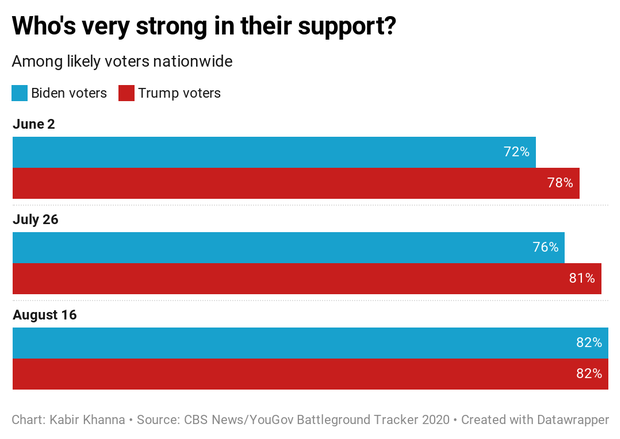The selection of Kamala Harris as Joe Biden's running mate has very quickly solidified the Democratic party base behind him heading into this week's Democratic National Convention.
Helped by a party that seems unified behind him, Joe Biden leads in our current estimate of the Electoral College — the only count that will matter — as his nominating convention begins. The CBS News Battleground Tracker model has Biden up in states worth 279 electoral votes, slightly more than the 270 needed to win in November. To be clear, that doesn't mean Biden will win. This is now.
The electoral map has expanded this summer. Multiple Southern states previously in the Republican column now look to be in play, like Arizona, Georgia, and even Texas. Biden currently leads in the three upper-Midwest states that President Trump narrowly flipped in 2016: Michigan, Pennsylvania, and Wisconsin.
All that opens up multiple paths for Biden to reach 270, as we have seen widespread movement toward him, rather than shifts in just a few states. We estimate that states worth 96 electoral votes are toss-ups, including others that Mr, Trump won, like Iowa and Ohio. However, states currently leaning toward Biden could go back to toss-up status or even lean Republican if the race changes down the road.
Biden is helped by strong commitment from key parts of the Democratic base, plus gains among groups such as women, especially White women with college degrees. Our statistical model takes into account voting preferences of all kinds of voters throughout each state and nationally, as well as how many of them there are in each state, and produces estimates for all 50 states.
Biden leads Mr. Trump by 10 points in the preference of likely voters nationwide, as he did in July. Here's a closer look at the landscape and key groups across the country.
Among women, voters under 30, and White voters with college degrees, Biden continues to hold a substantial lead. While Mr. Trump maintains a lead among White voters without college degrees, it's narrower than his margin among the group four years ago. On the other hand, White evangelicals continue to overwhelmingly support him.
Biden now leads Mr. Trump among Black voters 90% to 6%. This is higher than the 72% of Black voters who backed Hillary Clinton heading into her nominating convention in 2016.
Biden also holds a sizable lead among Hispanic voters today, helping keep states like Arizona and Texas competitive, and he's nearly doubled his lead among suburban voters since July — extending a seven-point lead to 13 points today.
The biggest news is that at least in the CBS polling, Biden has closed the enthusiasm gap.

Biden is in a very strong position with 80 days to go. We'll see if he and Kamala can hold on to or God willing, increase this lead.